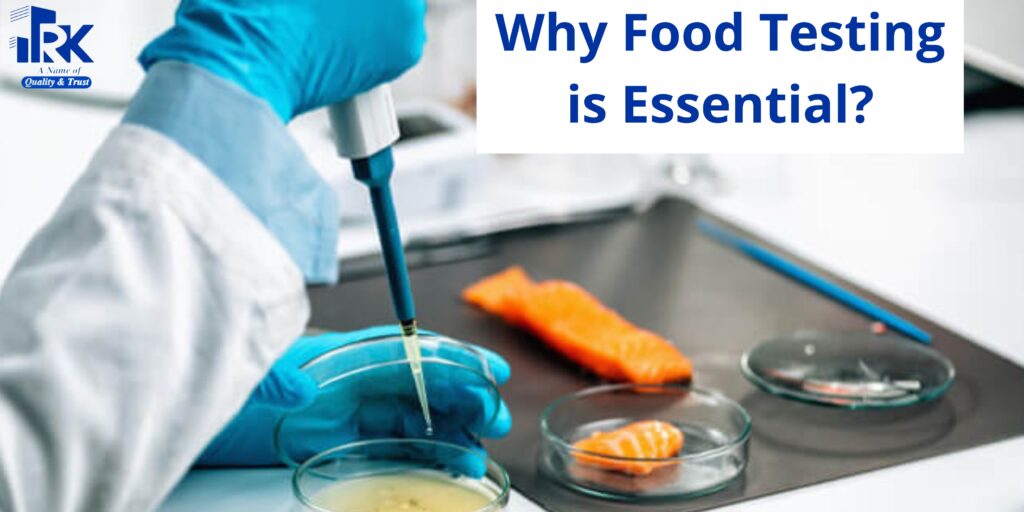Food safety is a major concern in India due to the increasing risks of adulteration, contamination, and poor quality in food products. To ensure that the food we consume is safe, nutritious, and free from harmful substances, food testing laboratories play a crucial role.
RKCT Laboratory is one of the best food testing laboratories in India, providing accurate and reliable testing services to ensure food quality and compliance with FSSAI, NABL, and IS standards.
Importance of Food Testing
Food testing is a critical process that ensures the food we consume is safe, nutritious, and free from harmful substances. It helps maintain public health, prevent foodborne illnesses, and ensure compliance with food safety regulations.
1️⃣ Ensuring Food Safety
- Food contamination can lead to serious health risks like food poisoning, infections, and long-term diseases.
- Testing detects harmful bacteria, viruses, fungi, and toxic chemicals that could be present in food.
2️⃣ Preventing Food Adulteration
- Food adulteration is a major problem in India, where substances like urea, washing powder, synthetic dyes, and starch are added to food to increase quantity but lower quality.
- Regular food testing helps in identifying and removing adulterants to prevent health hazards.
3️⃣ Maintaining Nutritional Quality
- Ensures that food contains the required proteins, vitamins, minerals, carbohydrates, and fats as per standard guidelines.
- Verifies food labels to prevent misleading nutritional claims.
4️⃣ Complying with Regulatory Standards
- Food testing ensures that products meet FSSAI (Food Safety and Standards Authority of India), NABL (National Accreditation Board for Testing and Calibration Laboratories), and IS (Indian Standards) guidelines.
- Compliance with these standards is mandatory for food manufacturers, suppliers, and exporters.
5️⃣ Extending Shelf-Life and Storage Stability
- Food testing helps determine how long a product remains safe for consumption by checking for spoilage, microbial growth, and nutrient degradation.
- This ensures proper labeling of expiry dates and improves food storage practices.
6️⃣ Consumer Protection and Trust
- Authenticity and transparency in food production increase consumer trust.
- Regular food testing ensures that consumers get high-quality, safe food products.
Food Testing Services at RKCT Laboratory
RKCT Laboratory is one of the best food testing laboratories in India, providing advanced, reliable, and FSSAI-approved testing services. The lab follows strict IS standards and uses modern technology for accurate results.
1️⃣ Microbiological Testing
✅ Identifies harmful microorganisms like:
- Bacteria (E. coli, Salmonella, Listeria, Staphylococcus)
- Fungi & Molds (Aspergillus, Penicillium)
- Viruses (Hepatitis A, Norovirus)
📌 Standard Code: IS 5887:1976 (Microbiological testing in food products)
2️⃣ Chemical Testing
✅ Analyzes the presence of harmful chemicals and residues:
- Pesticide Residues – Found in fruits, vegetables, and grains (IS 13864:1993)
- Heavy Metals (Lead, Mercury, Arsenic, Cadmium) – Found in water, dairy, and processed food (IS 15303:2003)
- Aflatoxins – Fungal toxins in grains, peanuts, and spices (IS 16287:2014)
- Preservatives – Such as sodium benzoate, sulfur dioxide (IS 10033:1981)
3️⃣ Nutritional Analysis
✅ Determines the nutritional value of food:
- Proteins, carbohydrates, fats, fiber, and vitamins
- Caloric value calculation
📌 Standard Code: IS 1656:2007 (Food nutrient analysis)
4️⃣ Food Adulteration Testing
✅ Detects common adulterants in food products:
- Milk Adulteration: Urea, starch, detergent, formalin (IS 1479:1961)
- Tea & Coffee: Artificial coloring, iron fillings
- Spices: Lead chromate, artificial dyes
- Edible Oils: Mineral oil, Argemone oil (IS 4701:1981)
5️⃣ Shelf-Life & Stability Testing
✅ Ensures food remains safe throughout its shelf life:
- Microbial growth monitoring
- Chemical stability testing
- Packaging material analysis
📌 Standard Code: IS 16471:2017 (Food shelf-life and storage testing)
6️⃣ Packaged Drinking Water Testing
✅ Tests for water quality and contaminants:
- Total dissolved solids (TDS), pH levels, heavy metals, microbial contamination
- Ensures compliance with IS 10500:2012
📌 Standard Code: IS 10500:2012 (Drinking water safety)
7️⃣ Meat, Poultry & Seafood Testing
✅ Ensures the quality, freshness, and safety of:
- Chicken, mutton, fish, shrimp, eggs
- Presence of antibiotic residues, harmful bacteria, and toxins
📌 Standard Code: IS 16471:2017 (Meat & poultry testing)
8️⃣ Bakery & Confectionery Testing
✅ Tests bread, biscuits, chocolates, sweets for:
- Chemical additives like artificial sweeteners and emulsifiers
- Microbial contamination
- Shelf-life stability
📌 Standard Code: IS 5403:1999 (Yeast & mold detection in bakery products)
IS Standard Codes Followed at RKCT Laboratory
RKCT Laboratory follows Bureau of Indian Standards (BIS) IS codes for food testing, including:
📌 IS 10033:1981 – Food preservatives testing
📌 IS 4701:1981 – Vegetable oil quality test
📌 IS 10500:2012 – Drinking water safety standards
📌 IS 1479:1961 – Milk adulteration detection
📌 IS 13864:1993 – Pesticide residue testing
These standards ensure food quality, safety, and legal compliance.
Conclusion
Food testing is essential for maintaining health, preventing foodborne diseases, and ensuring regulatory compliance. RKCT Laboratory provides high-quality food testing services in India, ensuring that food products meet FSSAI, NABL, and IS standard codes.
📞 For food testing services, contact RKCT Laboratory today!
Need Help?
FAQs
Q1. Why is food testing necessary?
✅ Food testing ensures that food is safe, nutritious, and free from harmful contaminants, preventing health risks and ensuring compliance with food safety laws.
Q2. Which organizations regulate food testing in India?
✅ Food testing is regulated by:
- FSSAI (Food Safety and Standards Authority of India)
- BIS (Bureau of Indian Standards)
- NABL (National Accreditation Board for Testing and Calibration Laboratories)
Q3. What types of food contaminants are commonly found in India?
✅ Common contaminants include pesticides, heavy metals, aflatoxins, bacteria (E. coli, Salmonella), and adulterants (urea, synthetic dyes, washing powder in milk, etc.).
Q4. How can I get my food tested at Laboratory?
✅ You can submit a sample at +*Laboratory, where tests are conducted as per IS and FSSAI standards. A detailed report is provided on the safety and quality of the food product.
Q5. How long does food testing take?
✅ Basic tests take 24-48 hours, while chemical and microbiological analysis can take 5-7 days.




